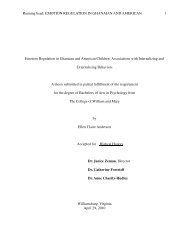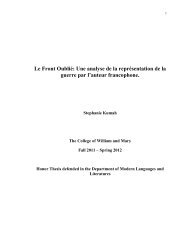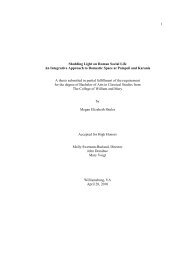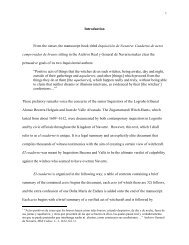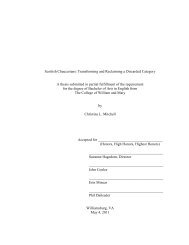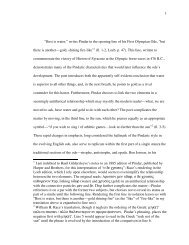Southern planter - The W&M Digital Archive
Southern planter - The W&M Digital Archive
Southern planter - The W&M Digital Archive
Create successful ePaper yourself
Turn your PDF publications into a flip-book with our unique Google optimized e-Paper software.
1859.] THE SOUTHERN PLANTER 389<br />
bonic acid, the vapor of water, (races of<br />
ammonia, and of nitric acid. A young<br />
plant, placed in the free atmosphere, and<br />
exposed to the light of the sun, gradually<br />
increases in size and weight, and receives<br />
carbon constantly from the corbonio acid of<br />
the air, which is decomposed, and evolves<br />
the liberated oxygen. <strong>The</strong> power by which<br />
this decomposition is produced is now known<br />
to be due to the solar ray, which consists of<br />
a peculiar impulse, or vibration, propagated<br />
from the distant sun, through a medium<br />
filling all space.<br />
It is a principle of nature, that power is<br />
always absorbed in producing a change in<br />
matter. This change may be permanent,<br />
or it may be of such a character, as to reproduce<br />
the power which was expended in<br />
effecting it. * * * For example, the effect of<br />
the impulse from the sun is to decompose the<br />
carbonic acid which surrounds the leaf of<br />
the plant, or, in other words, to overcome<br />
the natural attraction between the carbon<br />
and the oxygen of which the acid is composed<br />
; and, in this effort, the motions of<br />
the atoms of the etherial medium are them-<br />
selves stopped. <strong>The</strong> power, however, in<br />
this case, is not permanently neutralised<br />
for, when the plant is consumed, either by<br />
rapid combustion or by slow decay ; that is,<br />
when the carbon and the oxygen are again<br />
suffered to rush into union, to form carbonic<br />
acid—the same amount of power is evolved<br />
in the form of light, heat, or nervous force,<br />
which was absorbed in the original compo-<br />
sition. If the plant, moreover, be consumed<br />
in the animal, the same power is expended<br />
in building up the organization, in<br />
producing locomotion and the incessant ac-<br />
tion of the heart, and the other involuntary<br />
movements necessary to the vital process.<br />
Plants are, therefore, the recipients of<br />
the power of the sun-beam. <strong>The</strong>y transfer<br />
this power to the animal, and the animal<br />
again returns it to celestial space, whence it<br />
emanated. Properly to so direct this power<br />
of the sun-beam, that no part of it may run<br />
to waste, or be unproductive of economical<br />
results, it is essential that we know some-<br />
ell expended in<br />
exclusive devotion to this one subject. <strong>The</strong><br />
researches which have been made, in regard<br />
to it, have developed the fact, that the im-<br />
pulses from the sun are of, at least, four dif-<br />
ferent characters, namely, the lighting im-<br />
pulse, the heating impulse, the chemical<br />
impulse, and the phosphorogenic impulse;<br />
and it has further been ascertained that,<br />
though each of these impulses may produce<br />
an effect on the plant, the decomposition of<br />
the carbonic acid is mainly due to the chem-<br />
ical action. A scries of experiments is required<br />
to determine the various conditions<br />
uriuYr which these impulses from the sun<br />
may be turned to the greatest amount of<br />
economical use, and what modifications they<br />
may demand, in order to the growth of peculiar<br />
plants. <strong>The</strong> fact has not yet been<br />
clearly ascertained, whether some of these<br />
emanations cannot be excluded with beneficial<br />
result, or, in other words, whether they<br />
do not produce an antagonistic effect, and<br />
what relative proportions of them are absorbed<br />
by the atmosphere, or reflected from<br />
our planet, without reaching the earth, by<br />
the floating clouds of the air. To determine<br />
these, requires a series of elaborate<br />
experiments ancf accurate observations. We<br />
have said that the chemical vibration is that<br />
which principally decomposes the earbonic<br />
acid, in the growth of the plant; but we<br />
know that the heating impulse is an auxiliary<br />
to this, and that heat and moisture are<br />
essential elements in the growth of vegetation.<br />
<strong>The</strong> small amount of knowledge we<br />
already possess of the character of the em-<br />
anations from the sun, has been turned to<br />
admirable account in horticulture. In this<br />
branch of husbandry, we seek, even more<br />
than in agriculture, to modify the processes<br />
of nature; to cultivate the plants of the<br />
torrid zone amid the chilling winds of the<br />
northern temperate zone; and to render the<br />
climate of sterile portions of the earth congenial<br />
to the luxurious productions of more<br />
iavored regions. We seek to produce artificial<br />
atmospheres, and to so temper the im-<br />
pulses from the sun, that the effects of va-<br />
riations in latitude, and the rigor of the<br />
climate, may be obviated.<br />
From all that has been said, therefore, it<br />
will be evident, that the hopes of the future,<br />
thing of its nature; and the lifetime cfj<br />
labor of many individuals, supported at<br />
public expense, would be w<br />
(<br />
T<br />
in regard to agriculture, principally rest<br />
upon the advance of abstract science—not<br />
upon the mere accumulation of facts, of<br />
which the connexion and dependence are unknown,<br />
but upon a definite conception of the<br />
general principles of which these facts are<br />
the result. All the phenomena of the atmosphere<br />
should be studied and traced to<br />
the laws on which they depend. <strong>The</strong> labor<br />
bestowed upon investigations of this kind is




